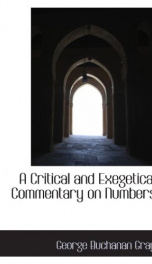a critical introduction to the old testament

Purchase of this book includes free trial access to www.million-books.com where you can read more than a million books for free. This is an OCR edition with typos. Excerpt from book: CHAPTER III THE PENTATEUCH: TRADITION AND CRITICISM The Pentateuch is a single work which after its completion was divided into five parts : these parts received from the Greek translators the distinctive names, Genesis, Exodus, Leviticus, Numbers, Deuteronomy. In Jewish usage the single term Torah, Law, covers the whole, and that the five sections are parts of a single whole is further implied by the Jewish term for themthe ' five-fifths of the law.' Within the Pentateuch, indeed, according to modern critical theory, many different books or works are frag- mentarily preserved; but no book postulated by this theory coincides with any of the five divisions of the Pentateuch. Among the independent or older works included in the Pentateuch are books of law, and from these the Jewish title for the whole is derived ; yet the Pentateuch as a whole, though entitled ' the Law,' is in form a history containing law rather than law containing history. Opening with the Creation of the world, the narrative in Genesis passes rapidly through the story of the early stages in the history of mankind, to follow with greater particularity the fortunes of Abraham and his descendants, and of these principally the line of Isaac, Israel (or Jacob), and the twelve sons of Israel. So far Genesis. Exodus carries on the narrative of Israel's descendants; their enslavement in Egypt, their release, their journey to Sinai, and their reception of the Law. Then follows a long section mainly consisting of laws and instructions (Ex. xx.- Num. x. 10). The narrative is resumed with the departurefrom Sinai (Num. x. 11 ff.), the subsequent wanderings in the wilderness, and the conquest of Eastern Canaan; and then, after another long section of law that occupies the central part of Deuteronomy, it closes...
Info about the book
Author:
Series:
Unknown
ISBN:
1173206299
Rating:
4/5 (1)Your rating:
0/5
Languge:
English
Users who have this book
Users who want this book
What readers are saying
What do you think? Write your own comment on this book!
write a commentif you like a critical introduction to the old testament try:
Do you want to exchange books? It’s EASY!
Get registered and find other users who want to give their favourite books to good hands!


